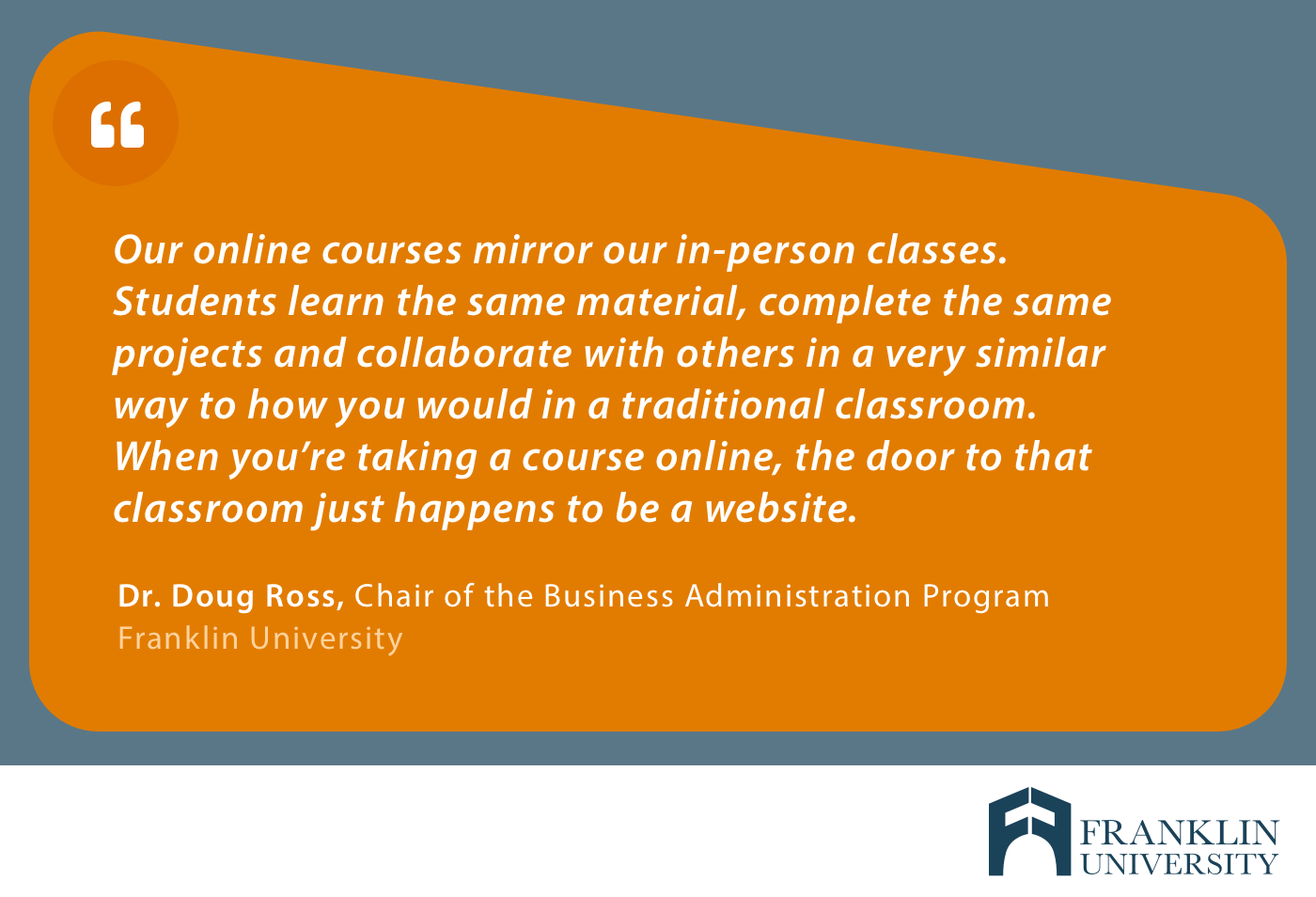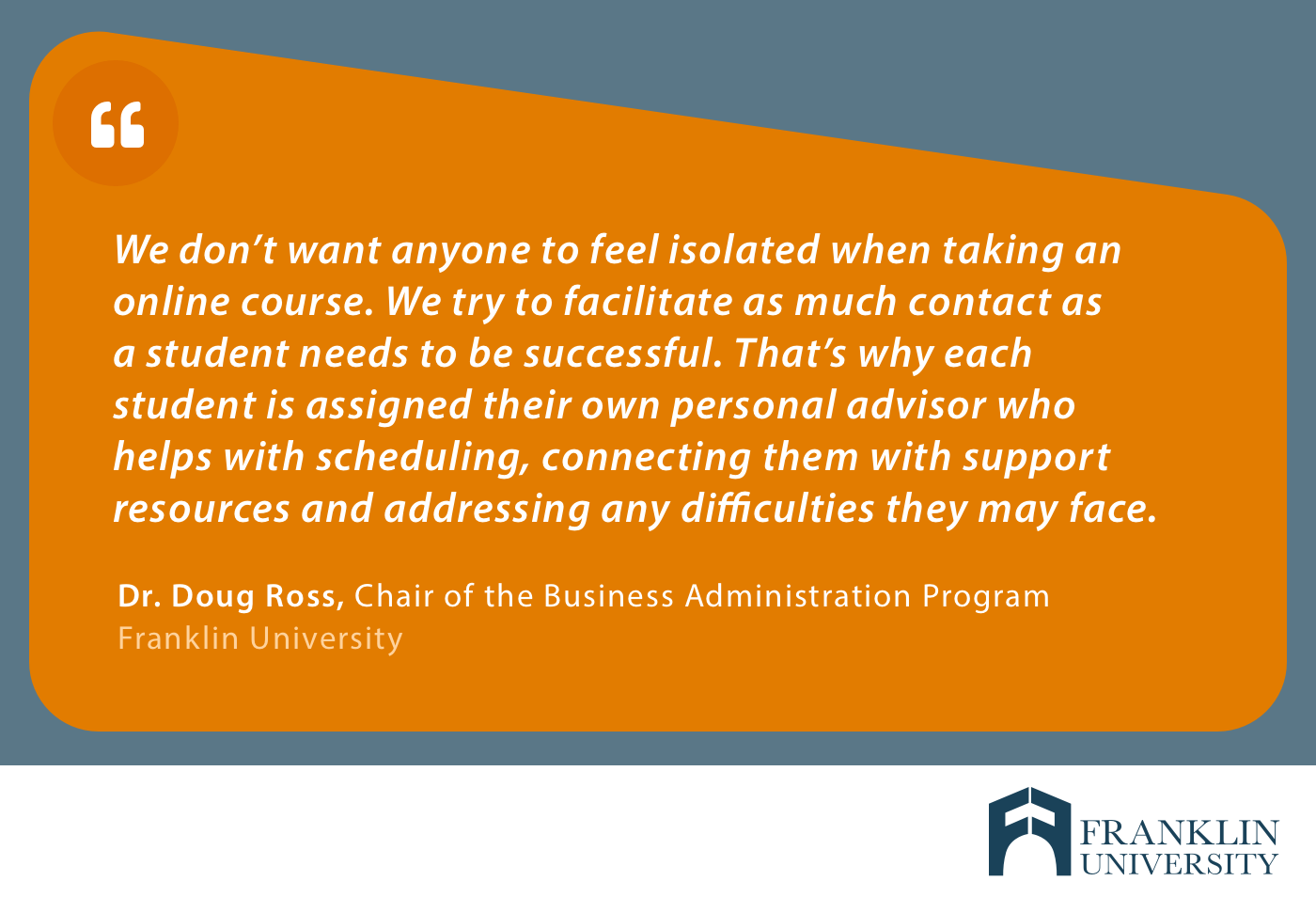Request Information
We're Sorry
There was an unexpected error with the form (your web browser was unable to retrieve some required data from our servers). This kind of error may occur if you have temporarily lost your internet connection. If you're able to verify that your internet connection is stable and the error persists, the Franklin University Help Desk is available to assist you at helpdesk@franklin.edu, 614.947.6682 (local), or 1.866.435.7006 (toll free).
Just a moment while we process your submission.

How Does Online College Work?
The desire for more affordable, accessible and flexible education has spurred immense growth in online education.
According to Forbes, the global online learning industry is growing by millions of students each year and the industry is expected to grow to $331 billion by 2025. On the other hand, according to EMSI labor analytics, traditional on-campus degree completions are in decline—experiencing a 4% decrease from 2012–2018.
The rise in popularity of online college may have you asking yourself: “Should I be getting my degree online?” That probably isn’t the only question you have either. We’re here to help clear things up and give you insight into how online college really works.
Are Degrees from Online Colleges Legitimate?
A: Yes, if you attend a reputable online college.
There are a large number of colleges and universities offering online education. So how do you know which ones are legitimate? There are a wide variety of considerations when it comes to choosing a high-quality online degree.
First of all, there’s the consideration of for-profit vs. nonprofit colleges. In the past, some for-profit institutions made headlines for promising students career-advancing degrees and instead, their students only amassed debt without proven outcomes. However, not all for-profit colleges fall into that category and not all nonprofits are well-equipped to offer online degrees. It’s a lot to consider when trying to identify a quality online program.
There’s also the consideration of online-only colleges vs. traditional universities that offer online courses. You need to ensure online-only colleges are well-respected. Traditional universities may lend more credibility, but you also need to ensure their online programs are as high-quality as their in-person programs.

With all of this in mind, how do you choose an online college that offers high-quality and respected degrees?
- Regional Accreditation: Regional accreditation shows that an institution meets the highest standards for programs, faculty and student success. Credits earned at regionally-accredited institutions are also more widely accepted as transfer credits.
- High Graduation Rates: Successful online programs will graduate the vast majority of students who enter their programs. Low graduation rates can be indicative of poor student experience and lack of support.
- Online Reviews: First-person experiences can shed light on what it’s really like to be a student at an online college. Stories of successful student outcomes should be easy to find.
Are Online Colleges 100% Online?
A: It varies by program.
Some are 100% online, while others may offer on-campus courses and take a hybrid approach.
In a fully-digital program, students typically view lectures via on-demand videos, participate in group discussions through chat rooms, and collaborate with other students through video conferencing. In a hybrid model, lectures are usually completed online, while in-person classes give students the opportunity to ask questions and collaborate face-to-face.
Most students choose an online program because they want the flexibility of completing their entire degree online at their own pace. However, don’t feel like your only choice is a completely online college. Choosing a traditional college or university with a strong reputation can lend credibility to an online degree, even if you never visit their campus.
When it comes to paying for school, grants are among your best options. But do you know how to find them? Remove the guesswork by downloading this free guide
What Technology Is Required to Take An Online Course?
A: All you need to complete your degree online is access to a computer with an internet connection.
It’s that simple. Courses are designed to be very user-friendly, so if you have general computer literacy and regularly use the internet, you shouldn’t have issues completing an online course.
For each course, you will go to your course website to attend lectures, participate in discussions, and complete quizzes and assignments. Some courses will require you to log in at a specific time for a live lecture and discussion, but even these courses are recorded for students who are unable to attend. The goal of online education is to create a flexible learning environment so individuals can more easily balance their professional, personal and education commitments.
How Often Do You Interact with Your Professor and Other Students?
A: If you choose the right program, as often as you want.
Online programs should make sure you have direct access to professors, advisors and classmates—as much as you would in a traditional program.

During class sessions, you can interact with professors and classmates through online chat. Outside of class, you can exchange emails and phone calls with professors and advisors. In many online courses, you will also be required to complete group work assignments. For these assignments, some online colleges provide the ability to book online conference rooms where you can meet “face-to-face” using laptop cameras and microphones.
Are Online Degrees Easier or Faster Than Earning Your Degree In Person?
A: It depends on your needs as a student.
Let’s set the record straight—an online class is just as much work as an in-person class. You’re required to complete the same coursework you would for any other degree. But, there are aspects of online education that can make getting your degree more attainable, especially if you’re a working professional.
- Asynchronous courses, which do not have to be attended on a specified day and time, make it easier to complete coursework around your schedule.
- Balanced scheduling, which is practiced by high-quality online colleges, ensures that the amount of work that needs to be completed each week is about the same over the length of the course.
- Flexible scheduling can provide you the opportunity to take courses at your own pace. Whether you only have time to take one course at a time, or can take multiple classes, you can find the right fit for your schedule.
If you have the ability to take multiple courses at a time, many online degrees, especially master’s degrees, can be completed on accelerated timelines. The number of course credits required will be equivalent to a degree that would be completed on-campus, but the frequency of courses, flexible academic calendar and transfer-friendly nature of some online colleges can expedite degree completion.
Not All Online Colleges Are Created Equal
Now you have a better understanding of how online college works. Does it sound like a great option for you and your career goals? If so, now you need to find the right online college.
Franklin University’s online degrees are specifically designed for the needs of busy working adults who want to gain in-demand skills. Franklin offers transfer-friendly degree programs taught by industry experts that can be completed at your pace. With 75 different online degree programs, Franklin makes it easy to find the degree program that is right for you.





